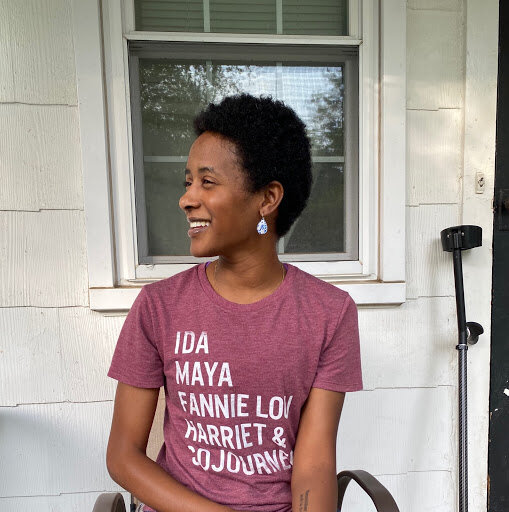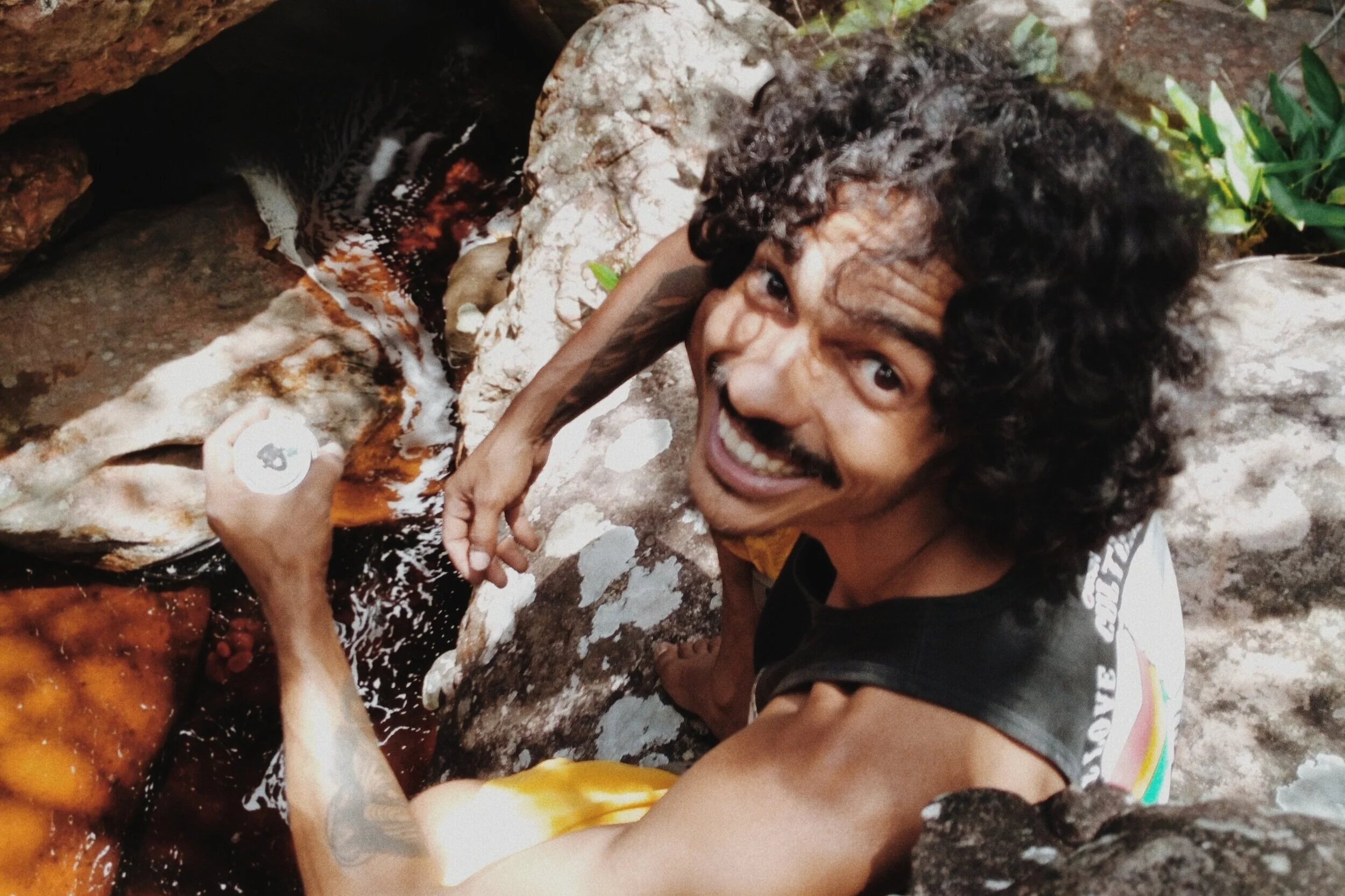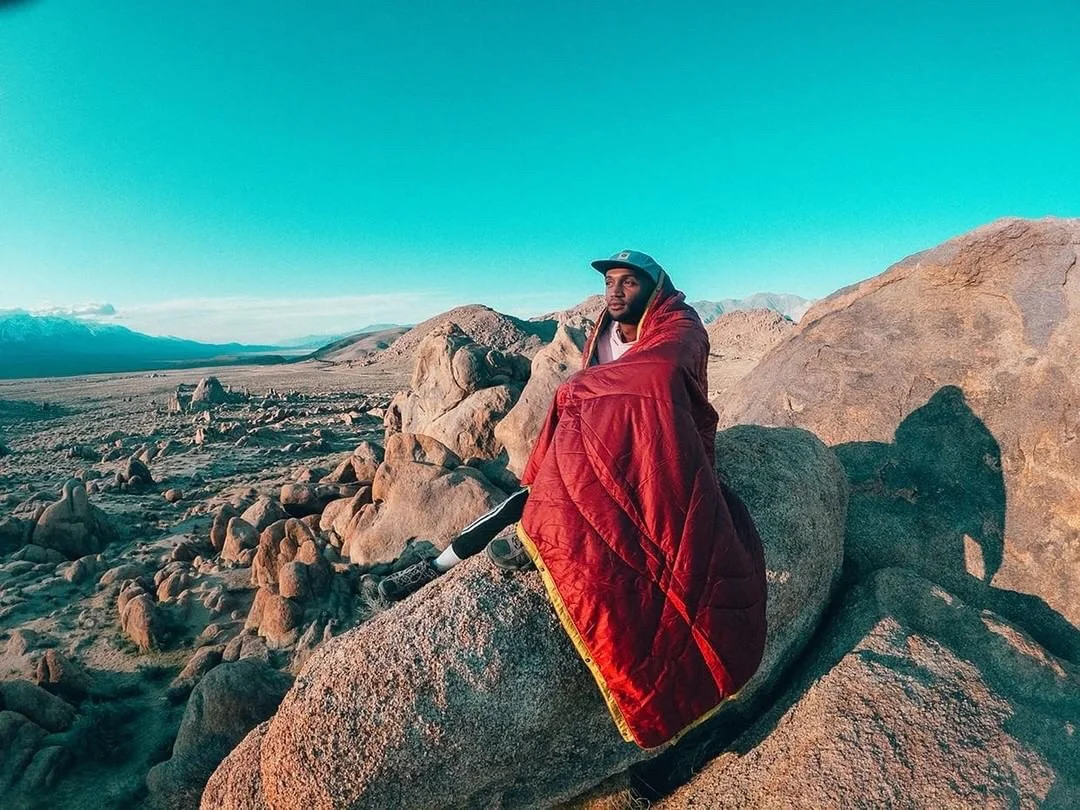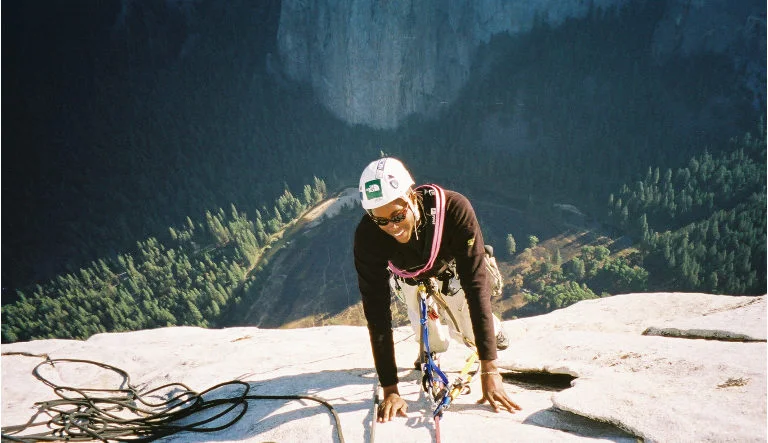8 Ways to Handle Race Based Stress
The author resting on a wall at Shenandoah National Park, a formerly racially segregated park located on Manahoac land. Photo courtesy of the author.
Do you remember the first time you were called a racial slur? Or the first time you were excluded because of your skin color? I do.
Racism is a daily occurrence for people of color - especially for Black and Indigenous people - and it starts young. On any given day, we survive encounters with racist individuals, cultures and institutions, like our workplaces, hospitals, schools and legal system, says Dr. Robert T. Carter, Professor of Psychology and Education, Teachers College, Columbia University.
Being Black in a racist society is stressful, with implications for our physical and mental health. We experience trauma, as a result of racism, that cuts across socioeconomic divisions. We are stereotyped as ignorant, uneducated, ugly, hyper-sexual, criminal and told that our lives have less value. These racist stereotypes are built into the bedrock of American institutions. The criminal Black man must be policed; the unruly Black child is incapable of learning and must be disciplined; the Black victim of sexual abuse was asking for it; the missing Black child doesn’t sell newspapers. It’s not surprising that racial trauma manifests in both our minds and in our bodies
“To be black and conscious in America is to be in a constant state of rage.”
Dr. Carter argues that racism can cause psychological harm, such as depression, anxiety and feelings of powerlessness and worthlessness. Race based stress can build up over long periods, from the very first time that we are disciplined unfairly as preschoolers or excluded on the playground to the early death that awaits us due to a combination of structural racism, environmental racism and poverty.
The author’s brother and nephew are pictured on a hike in Raleigh, NC on Mánu: Yį Įsuwą (Catawba) land. Photo courtesy of the author
Separate studies show that, over time, racism can also cause physiological harm. Race based workplace discrimination increases hypertension in black women. Black people who experience “chronic stress from maternal lifetime exposure to interpersonal racism” are 5 x more likely to deliver preterm very low birthweight (VLB) infants. It’s no wonder that Black infants are “twice as likely as white infants to die in their first year of life.” Race based stress can cause serious harm or death.
Confronting racism has its own cost. We are labeled as aggressive, ungrateful, paranoid, not a team player, too sensitive, not a good fit, or “the angry Black kid from Stranger Things.” We deal with denial and gaslighting from our co-workers, boss, or even our partner. We are expected to be grateful to be included in predominantly white spaces that we have zero ownership of. It’s, well—a lot.
Being a Black disabled womxn means I frequently face misogyny and ableism, in addition to race based stress. Other Black people with intersectional identities face the same dilemma. Try being a Black queer womxn or a Black trans womxn or a Black Muslimah. In my personal experience, one benefit of being disabled is that you develop a range of coping mechanisms as well as a robust support system. You don’t have a choice. You quickly learn when to ask for help.
Here are a few strategies that I’ve developed for handling race based stress. Disclaimer: I’m not a psychologist. Have a good strategy? Let us know in the comments!
1. I think about it
It’s 6 a.m. and I’m checking the text thread to see if any other black people have been murdered by police. I scroll through CNN, the New York Times, NPR and Twitter to see how anxious I’m going to be today. I don’t watch the videos, but I’m hyper aware of them—to avoid them, you have to be. Or maybe I replay the weird conversation from the meet-up yesterday in my head, over and over, wondering what the speaker actually meant by their comment. Later, in the middle of the night, I lie awake in pain considering why my white male doctor gave me only a few days of pain medication after a major surgery, when my follow-up isn’t for another two weeks. Was it intentional, or an oversight? Does he think Black people don’t feel pain? Or that I'm going to sell it? Now it’s 2 a.m. and I’m thinking about how Black women are routinely forced out of the corporate workplace for speaking up about racist things that happen to them. Obviously, this is not a strategy I would recommend. Still, it’s hard to avoid thinking about racism. It’s omnipresent in our life and in our society, and in my own mind.
“The details and symbols of your life have been deliberately constructed to make you believe what white people say about you. Please try to remember that what they believe, as well as what they do and cause you to endure, does not testify to your inferiority but to their inhumanity and fear.”
2. I don’t think about it
Sometimes I need a break from thinking about how stressful it is to be Black in the United States. Unfortunately, white America is just now realizing that this country has a racism problem, which means I can’t escape discourse on racism. Thank you two different white friends who gifted me copies of The Hate You Give.
On the Monday after George Floyd’s murder, I woke up to four different podcasts on the life of Ida B. Wells produced by four different white podcasters who typically cover whitewashed versions of U.S. history and true crime. It’s honestly a lot, y’all. There has to be a more equitable and less traumatic version of four white podcasts independently releasing episodes on lynching when it’s the last thing I want to talk about. I need a break.
3. I turn the volume up…
The author at home in Maryland. Photo courtesy of the author.
Some days, I turn the volume up to Blackness level 10,000. Yes, there are some days when I just need to be with the Black community - even if I can’t physically be with the Black community (hello quarantine). So I wake up with The Read, listen to You Had Me at Black on my morning walk and recap Insecure on Getting Grown as I get ready for telework. I pick out my 4c afro, slip into a Black By Popular Demand top from HGC Apparel and apply my foxy brown semi matte lip color by Mented. I check Instagram for the latest affirmation from Alex Elle and I put some dollars in the virtual tip jar for Beyu Caffe, my favorite Black owned small business from Durham, NC, and I’m ready to start my day. Wait, wait, let me see what Cynthia Andrew and her baby bump wore for Juneteenth—okay now I’m ready!
Scientific studies show that, for Black, Indigenous and People of Color, leaning into your racial identity can act as a buffer against race based stress. The urge you feel to support Black businesses, Black music, Black creatives, or in the words of Issa Rae, root for “...everybody Black” can protect you, to some degree, from the psychological and physiological stress of racism. So lean in.
4. I turn the volume down…
While I am 100% Black and a womxn and half a dozen other labels - none of those perfectly capture my person-hood. That doesn’t mean I ever stop being Black. As Marley Dias writes in her book Marley Dias Gets It Done (And So Can You), I’m also dreaming of “a world where black girls [a]re free to be complicated, honest, human; to have adventures and emotions unique just to them. A world where black girls’ stories [matter].” However, this is not that world.
With one exception*, every single book I read as a child which featured Black protagonists, was about slavery or Jim Crow segregation and Civil Rights protests. If you didn’t know better you would think Blackness is bookended by trauma and defined solely by suffering. Similarly, the world defines Blackness in a very narrow way. So some days, I deal with race based stress by acknowledging the obstacles my ancestors overcame, while continuing to define my own blackness. “Turning the volume down” enables me to be myself without feeling the pressure to perform Blackness, womxnhood or disability for anyone else.
5. I think about what I’m feeling and why
The author’s brother, sister and nephew during a pre-Covid family gathering. Photo courtesy of the author.
That means I make space to be a human being with emotional needs. Sometimes our Blackness, or our Latinidad or Indigeneity is defined by others as stoic or resilient, when in truth, we’re feeling anything but. What happens when we give ourselves space to be vulnerable, to ask for help—to be present with our emotions instead of masking or repressing those that are in conflict with the racial identity that someone else has constructed for us? Even if our elders or ancestors had a hand in creating the racial identity we’re trying to live up to, that doesn’t mean it’s 100% healthy for us. Racism also shaped it, and if we’re honest, so did misogyny and, for many of us, ableism, transphobia and homophobia.
When I get up in the morning and face the world, I often feel as if I have to be strong and tough with a clap back forged in the depths of Black Twitter, or else I’ll break. I don’t always have time to deal with big scary emotions. I don’t always have time to process race based trauma. Just look at the headlines and you’ll understand what I’m talking about. Still, my goal is to intentionally set aside time each day to focus on my emotional well being. My journal’s permanent home is on my night stand, but if I’m honest, sometimes an entire week goes by before I actually open it.
Slow hiking with my nephew and brother on Mánu: Yį Įsuwą (Catawba) land. Photo courtesy of the author.
6. I pay attention to what my body is feeling
I am someone who lives with chronic pain. Oftentimes, my chronic pain manifests as irritability, poor concentration or memory problems. Fortunately my friends and family recognize what this familiar constellation of symptoms means: I need to take my pain medications.
Race based stress, according to researchers, can cause a physiological, cognitive, and behavioral response. That means racial trauma takes root in our bodies as “headaches, body pains and aches, trouble sleeping, and difficulty remembering” and in our minds as “irritability, hostility, poor social and interpersonal relationships, lack of trust in people, self-blame [...] anxiety, anger, rage, depression, compromised self-esteem, shame, and guilt.” So listen to what your body is telling you. It may be time to see a therapist or talk to a family member or friend.
7. I tell a friend
Studies show that Black women are more likely to lean on our social support system as a coping mechanism in response to race based stress. That means when we experience racism, we are less likely to internalize it. Introversion is my superpower, and yet, even I know firsthand the importance of being able to share a painful experience with a friend or family member without being gaslighted or told the experience didn’t actually happen.
Spending time with family - like my sister and nephews - is just one way that I decompress and heal from racial trauma. Photo courtesy of author.
When I experience racism, I call my sisters. They’re both good listeners and they help me evaluate my options. Do I respond, or let it go? Do I report it? Will my workplace support me? Sometimes they have low patience—“why do you keep skydiving, when you know that the skydiving community is racist?”—but they are both deeply empathetic and wonderful.
Choose someone who has good listening skills and a working knowledge of your racial identity and racism. That’s not always a family member or even your partner. Sometimes the people we love are part of the problem or simply absent or too consumed by their own issues to be able to offer support. Check out Therapy for Black Girls, Therapy for Latinx or read An Asian American Therapist’s Guide to Asian American Mental Health to find a therapist near you.
8. I focus on doing the things I love
Can passion projects protect me 100% from race based stress? No they can’t. But #blackjoy has intrinsic value - even if it can’t entirely prevent racial trauma. Figure out what you’re passionate about, find friends with similar interests—gardening, hiking, K dramas—and join a community. Yes, it’s good to be passionate about black liberation, but there’s no reason why you can’t also enjoy trad climbing, succulents, BTS and homemade bread.
Focus on the activities you enjoy which are also immediately accessible. I can’t hike or skydive as much as I would like, due to the quarantine and my health, so I spend more time writing, drinking tea on my porch, and listening to Tawny Newsome and Andrew Ti respond to voicemails on Yo, Is This Racist?
Over the past five years, social media has become a positive and incredibly constructive force for the BIPOC outdoor community, allowing us to build community and create new narratives about People of Color in the outdoors. Like anything in life, there are drawbacks. Social media allows us to voice our anger, launch campaigns, raise money for bailout funds, organize marches, circulate petitions, call out systemic racism and memorialize victims of racial injustice who might otherwise be forgotten. That’s a lot of good.
Social media is also where Black people may feel pressure to perform blackness online, or to perform black activism - which can add to our stress level at a really inopportune time. We virtue signal with our protest selfies and in our captions we make sure to point out that we’ve been doing this longer than the next person. We've been styling our hair naturally for longer, we’ve been reading the right books for longer, we’ve been vegan and low waste for longer, we’ve been posting about race for longer, we’ve been supporting Black Lives Matter for longer, etc. Of course, virtue signaling isn’t unique to social media. It occurs offline too; and comparing ourselves to others is pretty normal human behavior. We ALL do it.
Yes, online can be a pressure cooker, but oftentimes IRL is just as bad. So do what you love and prioritize your mental and emotional health. If that means taking periodic breaks from social media, don’t worry; it’ll be here when you get back!
Cited Mental Health Sources & Additional Resources:
LGBTQ+ Youth Are Not Alone. Internet Service Providers [online] Available at: <https://www.isp.com/blog/lgbtq-youth-online-resources/>
Therapy For Black Girls. 2020. Therapy For Black Girls. [online] Available at: <https://therapyforblackgirls.com/>
Therapy for Latinx. 2020. Therapy for Latinx. [online] Available at: <https://www.therapyforlatinx.com/>
Gabrielle. “An Asian American Therapist’s Guide to Asian American Mental Health.” Plan A Magazine. <https://planamag.com/an-asian-american-therapists-guide-to-asian-american-mental-health/>
Carter, Robert T. “Racism and Psychological and Emotional Injury: Recognizing and Assessing Race-Based Traumatic Stress.” The Counseling Psychologist 35, no. 1 (January 1, 2007): 13–105. https://doi.org/10.1177/0011000006292033.
Collins, James and Richard David. “Very Low Birthweight in African American Infants: The Role of Maternal Exposure to Interpersonal Racial Discrimination.” American Journal of Public Health 94, no.12 (December 2004): 2132–2138. https://ajph.aphapublications.org/doi/10.2105/AJPH.94.12.2132
*The Snowy Day by Ezra Jack Keats


























As knowledge of the outdoors tends to be handed down generationally, this broken chain has denied today’s black youth the tools they need to be able to tackle the outdoors with any degree of confidence […] we have effectively become an urbanised people.